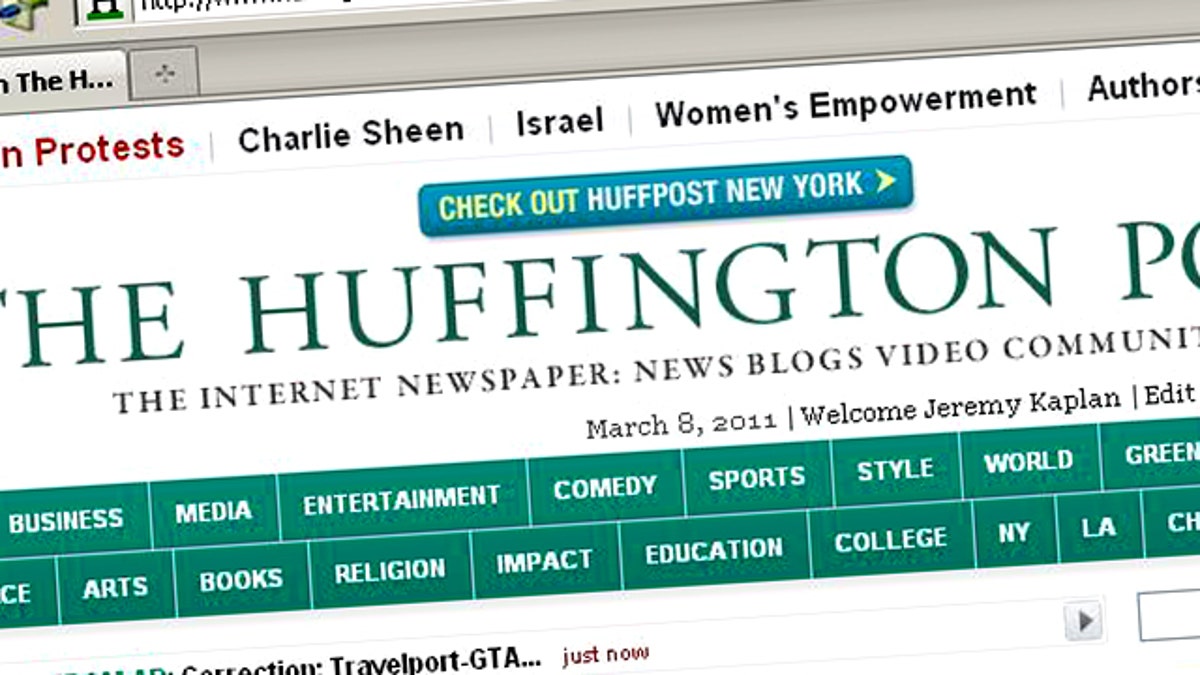
(The Huffington Post)
"Crowdsourcing" powers sites like The Huffington Post and Wikipedia. But not for much longer.
Readers are becoming skeptical, web searches are starting to block them, and now the mob of unpaid folks responsible for much of the work is turning on the hand that fails to feed it, demanding -- shock, horror! -- to be paid.
Imagine that.
Originally hyped using marketing buzzwords like "user generated content" and "crowdsourcing," the basic idea was simple: Convince people online to submit free information (reviews, song listings, citizen journalism reports, etc.), and then collect it all and sell it to advertisers and gullible investors. It was catnip to website developers: virtually no capital investment and pure profit.
It sounds too good to be true, but there have been successes. Music information site Gracenote used to get most of its information for free. It's now owned by Sony. Wikipedia put Microsoft's Encarta out of business, and it reduced the Encyclopedia Britannica to a $100-plus a year online subscription service.
And money is pouring into hip destinations like question-and-answer networking site Quora (if you haven't heard of it yet, you will soon). Even AOL got sucked in, recently paying $315 million for one of the most well-known crowdsourced blogs, The Huffington Post. There are scores of others, of course, ranging from content farms like Demand Media and Seed to niche sites like Yahoo Answers, Stackoverflow and Ask.com.
But there are flies buzzing in the crowdsourcing pool.
Readers increasingly regard such sites as notoriously inaccurate, irrelevant and generally suspect. Restaurant reviews in Yelp may be posted by relatives of restaurateurs -- or competitors. Company profiles in Wikipedia may be written by the business' own PR department. And so-called citizen journalists at The Huffington Post may be publishing material that's actually written by marketing pros spinning "news" stories.
Indeed, HuffPo founder Arianna Huffington recently admitted as much, saying that her contributing authors are like those who appear on talk shows simply to promote their own books and movies.
The problem has also caught the attention of the world's search engine, Google. It launched a counterattack last week, changing its algorithm to kill listings from what it determines are content farms or "low-quality" sites. Bad news indeed for crowdsourced news.
An even more threatening groundswell may be underway. Some of the unpaid, unappreciated volunteers supplying all this free content are going on strike. Many have become disillusioned with others taking credit for their work. Some have simply become bored (witness the decline in the number of volunteer editors working on Wikipedia). Still others have begun to resent the fact that their gratis work is lining the pockets of the owners of sites like The Huffington Post.
Visual Art Source, which had been supplying reprints of some solid art reviews to The Huffington Post, was the first to announce a "strike." It’s a small step, to be sure, but it raises the question, if others withdraw material from the site what did AOL actually pay for?
I don't expect that a great torrent of contributors will immediately abandon the HuffPo, but the trend is ineluctable. No one can sustain a work-for-free lifestyle. As the economy improves and people go back to work, crowdsourced sites will find themselves, well, without crowds of contributors.
Unfortunately, tech folks can't resist applying the same bad idea to every conceivable area of endeavor until it is thoroughly discredited. At the recent TED conference in Long Beach, CA -- the happening de jour for chic techies -- some panelists suggested that teachers (those outmoded educational tools) should turn classes over to crowdsourced videos and online information.
Throw out the text books written by wizened professors, they proclaimed, the kids are alright. Just let them watch YouTube!
Of course, teachers have heard of the Internet and many use online videos -- but they vet the material first -- just as they have always suggested what books to read or how to do proper research. They must because most of the "content" online has proven itself over and over again to be, well, garbage. Funny, amusing, sometimes engaging, yes, but also biased, untrustworthy, and usually inaccurate. Not exactly the ideal basis for a formal education.
Ultimately, crowdsourcing underscores the fallacy of free information: It violates the basic principles upon which our entire economy and culture is based. People focus on individual areas of endeavor, excel and become experts in those areas, and ultimately get compensated for those efforts. This applies to everyone from Justin Bieber to your local farmer. We pay truck drivers to bring us food, we pay doctors to heal the sick, we pay comedians to entertain us.
We even still pay musicians for music (you do, right?).
These are basic principles that even technology can't change. Put another way, you can fool some of the people some of the time . . . but only until the next high-tech fashion comes along.
Follow John R. Quain on Twitter @jqontech or find more tech coverage at J-Q.com.
